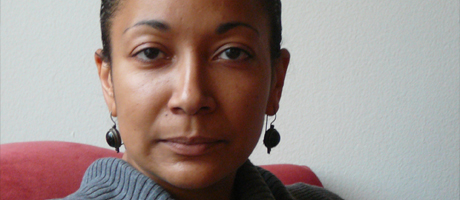Shocking! Offensive! Exciting!
Those are all common reactions to pornography. And Jennifer Nash, assistant professor of American Studies and Women’s Studies, would like to add another word to that list: Enlightening.
In her first book, The Black Body in Ecstasy: Reading Race, Reading Pornography, Nash tackles a subject that makes some people squirm: depictions of black women in hard-core pornography. But rather than condemn these films as inherently racist and anti-feminist, Nash asks what the portrayal of black women in porn tells us about culture, sexuality—and even humor.
Nash recently sat down to discuss her book (to be published next month by Duke University Press), and what it’s like to be a self-proclaimed “Pornoscholar.”
Q: How does pornography give us particular insights into racial and gender stereotypes? What’s special about porn?
If you think about racial fictions and mythologies—the stereotypes that circulate in our culture—I would argue that they are largely erotic in nature. Whether it’s the myth of the black male rapist or the myth of the hyper-reproductive black welfare queen, these stereotypes are deeply sexualized. Pornography is an interesting window for thinking about race because you see stereotypes at their grandest and most explicit. At the core of racial stereotypes are certain ideas about black sexual differences.
Q: Is it a misconception that pornography can be fundamentally racist in terms of objectifying black women?
I wouldn’t say it’s a misconception. But I think that’s the major reading of pornography. Even people who are so-called pro-pornography, who think it can represent women’s pleasure, have trouble with depictions of black women. That’s where they draw the line. It’s problematic—for non-academics and academics alike. The purpose of my book is not to say that pornography is never racist. Pornography is filled with extremely racist fictions but how does pornography use these racial mythologies to make space for black pleasure? How can black women take pleasure in these very things we think of as deeply offensive and troubling? How can black women explode these racial stereotypes on a pornographic screen? And, how can black women use humor to poke fun at these racial fictions?
Q: Speaking of poking fun, your Twitter handle is “Pornoscholar,” which tells me you’re approaching this topic using a bit of humor?
Very definitely! In fact, my book has a chapter on humor in porn. Pornography is a very funny genre. When people assume that pornography is exclusively about sexual arousal, they miss all of the other things that it does—including make us laugh. Porn has bad music. It has funny titles that often spoof on mainstream titles. It has silly characters. Nobody wears underwear. It’s very silly. That is part of pornography’s history, particularly in the 1970s when people watched it together in movie theaters. It makes us laugh together.
Q: Are people shocked or offended when you tell them that you are an academic who studies pornography?
Shocked, yes. Certain audiences are stunned that pornography is an academic pursuit, that scholars actually screen pornography and that we talk about pornography’s social meaning in class. People in gender studies know that pornography has been heavily debated and politicized for a long time. But outside of gender studies, the idea that pornography is something you would even talk about intellectually is odd, if not offensive. Anytime someone tries to take an academic approach to pornography, there’s this kind of backlash, like it’s not an intellectual subject.
Q: Are you getting any push-back from other scholars when you talk about finding value in stereotypes?
Where I get push-back is among folks in African-American Studies and black feminism. They are really uncomfortable with the idea that racial stereotypes can be productive or even pleasurable. There’s an idea that this is precisely what we shouldn’t be talking about; we should focus on eliminating stereotypes. I say: think of how these stereotypes themselves provide vehicles for talking about pleasures and desires. That is particularly important for black folks, especially black women, because there are so few cultural spaces where black women can talk about desire.
Q: What’s your next book project?
My next project is far, far removed from pornography. I’m looking at the relationship between women’s studies and black feminism in the contemporary university setting. So, as I like to tell people, my porn days are over.


